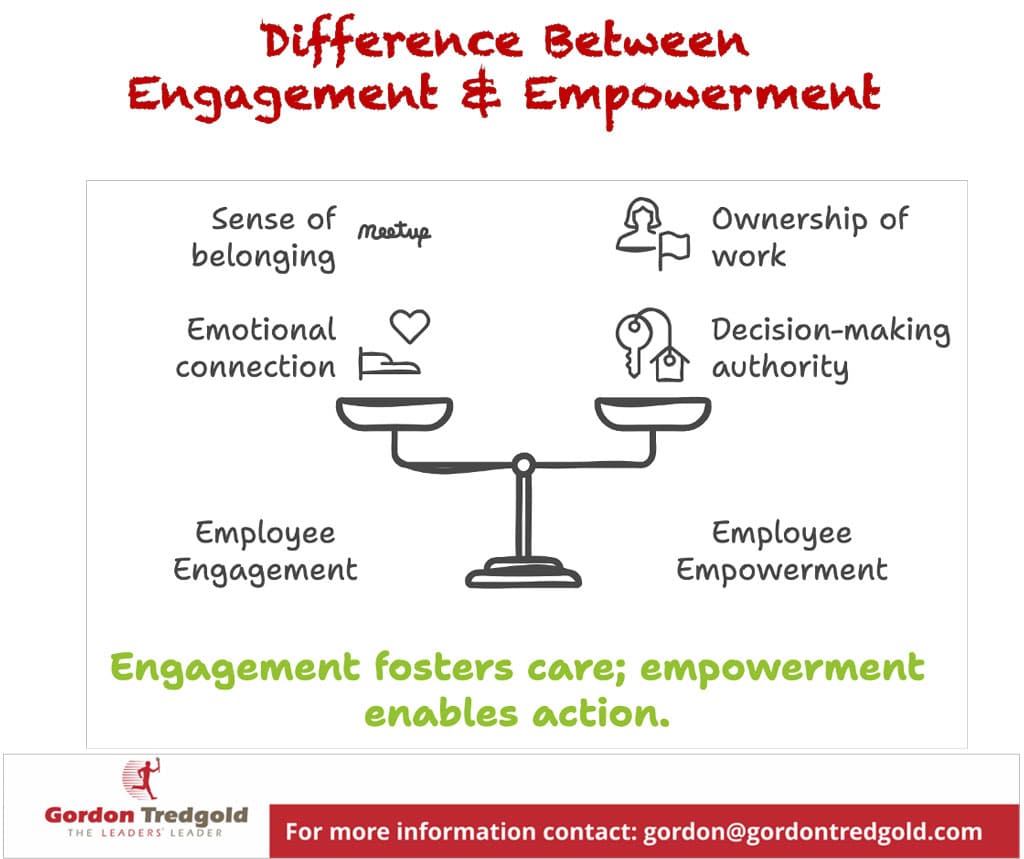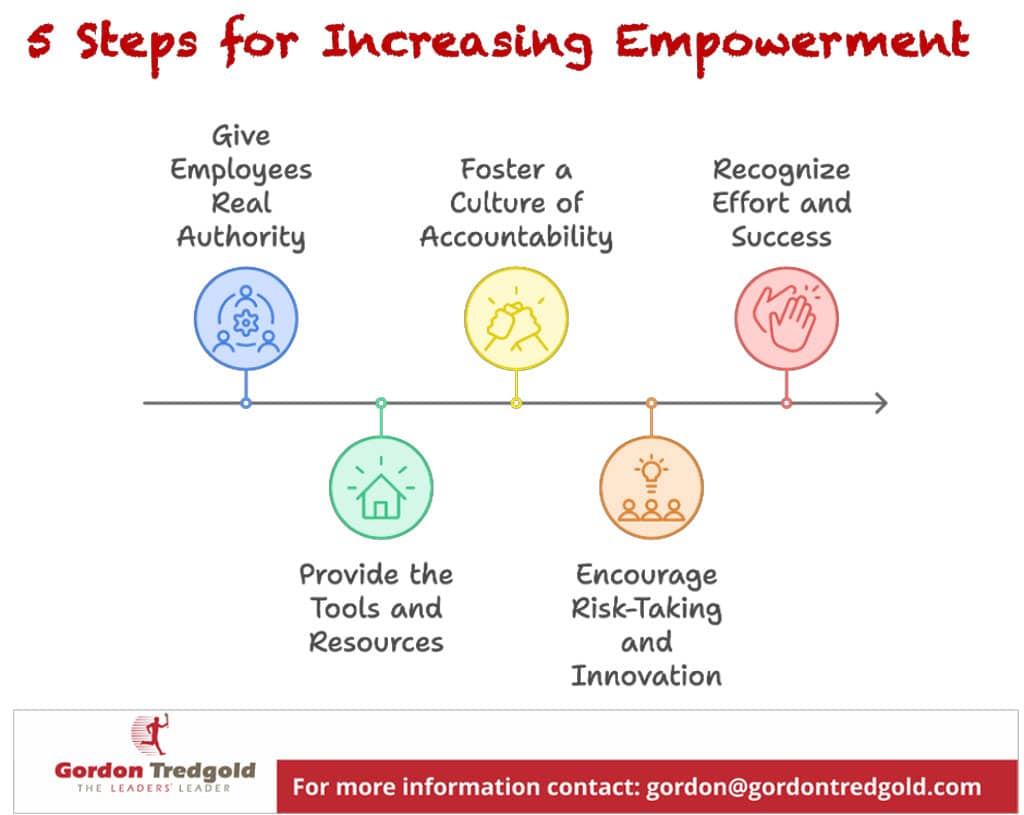Why Focusing on Employee Engagement Alone is a Waste of Time

Employee engagement has been the buzzword in leadership circles for years. Companies pour millions into engagement surveys, team-building exercises, and perks, all designed to make employees feel more connected and involved. But here’s the problem: engagement without empowerment is a recipe for frustration. You can engage your employees all you want, but if you don’t give them the power and authority to act on their ideas and take ownership of their roles, that engagement will quickly turn to disengagement.
The real secret to long-term success isn’t just engagement—it’s empowerment.
The Difference Between Engagement and Empowerment

Let’s start by defining the two. Engagement is about making employees feel connected to their work and the company’s mission. It’s about fostering a sense of belonging and making sure people care about what they do. It’s great—until it’s not. Engagement only goes so far if employees don’t have the ability to make decisions or take meaningful action in their roles.
Empowerment, on the other hand, takes engagement to the next level. It’s about giving employees the tools, resources, and authority they need to take ownership of their work. It’s about trusting them to make decisions, solve problems, and contribute in ways that matter.
Engagement says, “We want you to care about your work.” Empowerment says, “We trust you to make a difference.”
Without empowerment, engagement loses its value. You can have an engaged employee who cares deeply about the company’s success, but if they are constantly roadblocked by bureaucracy, micromanagement, or a lack of decision-making authority, that engagement will wither away.
The Problem with Focusing on Engagement Alone
When leaders focus solely on engagement, they’re only solving half the problem. Employees may be excited about their work, motivated by the company’s mission, and eager to contribute, but if they don’t have the authority or resources to act on their ideas, they will feel stifled. Over time, this creates a deep sense of frustration and can lead to high turnover rates.
Think of it like this: Imagine a car with a full tank of gas (engagement), but the driver (the employee) isn’t allowed to touch the steering wheel (empowerment). Eventually, the frustration of sitting idle will outweigh the excitement of being on the road, and the driver will lose interest. They might even leave the car altogether.
The truth is, engagement without empowerment leads to disengagement. Employees become disillusioned when they’re asked to care but are not given the tools or trust to make a real impact. This is why so many companies that focus heavily on engagement alone see diminishing returns.
Empowerment Leads to Ownership
When employees are empowered, they take ownership of their work. They stop being passive participants and become active contributors. Empowerment builds confidence, as employees feel trusted to make decisions, solve problems, and push projects forward without needing to constantly seek approval.
In my experience, the most successful teams are those where employees feel empowered to take action. They’re not waiting for a manager to tell them what to do—they’re figuring out how to solve problems and add value every day. This leads to a culture of innovation and accountability, where employees aren’t just engaged—they’re driving the company forward.
Empowerment also increases job satisfaction. When employees feel they have control over their work, they’re more likely to be motivated and invested in the outcome. This sense of ownership not only boosts morale but also leads to better performance, higher productivity, and increased retention.

How to Shift from Engagement to Empowerment
- Give Employees Real Authority
It’s one thing to say you trust your team, but it’s another to give them the authority to make decisions. Empowerment means letting go of micromanagement and trusting your team to get the job done. Set clear goals and expectations, and then step back and let them figure out the “how.” - Provide the Tools and Resources
Empowerment is not just about giving authority—it’s also about ensuring employees have the tools and resources they need to succeed. This could be training, access to technology, or simply the time to do the job well. When employees have the support they need, they feel more confident taking ownership of their work. - Foster a Culture of Accountability
Empowerment and accountability go hand-in-hand. When you empower your team, you also need to create a culture of accountability. This doesn’t mean blaming people when things go wrong—it means setting clear expectations and holding people responsible for their outcomes. When employees are empowered, they are more likely to take ownership of their successes and failures. - Encourage Risk-Taking and Innovation
Empowerment thrives in environments where employees feel safe to take risks. Encourage your team to come up with new ideas, challenge the status quo, and think outside the box. When people know they won’t be punished for trying something new, they are more likely to push boundaries and innovate. - Recognize Effort and Success
Finally, empowerment is reinforced through recognition. When employees take ownership and drive results, recognize their efforts. Recognition doesn’t have to be expensive—it can be as simple as a public acknowledgment of their contributions. What gets recognized gets repeated, and by recognizing empowered behavior, you’ll encourage more of it.
The Long-Term Benefits of Empowerment
Focusing on empowerment over engagement alone has long-term benefits that will transform your organization. Empowered teams are more innovative, more resilient, and more motivated. They aren’t just working toward a paycheck—they’re driving the success of the organization because they feel like a vital part of it.
Engagement can get you some short-term wins, but empowerment creates sustainable success. When employees are empowered, they not only stay engaged, but they also contribute more meaningfully to the company’s goals. They take risks, innovate, and push the company forward in ways that engaged—but disempowered—employees never will.
Conclusion: Stop Focusing on Engagement Alone
If you’re still focusing solely on engagement, it’s time to rethink your approach. Engagement is important, but it’s not enough on its own. If you’re not empowering your team to take ownership, make decisions, and contribute meaningfully, you’re leaving untapped potential on the table—and worse, you’re setting the stage for disengagement down the line.
True leadership isn’t just about getting people to care—it’s about giving them the tools and trust to make a difference. That’s where real transformation happens.
Have you read?
World’s Most Innovative Countries, Best Fashion Schools. Best Universities. Best Medical Schools. Best International High Schools. Countries: Most Female Billionaires.
Bring the best of the CEOWORLD magazine's global journalism to audiences in the United States and around the world. - Add CEOWORLD magazine to your Google News feed.
Follow CEOWORLD magazine headlines on: Google News, LinkedIn, Twitter, and Facebook.
Copyright 2025 The CEOWORLD magazine. All rights reserved. This material (and any extract from it) must not be copied, redistributed or placed on any website, without CEOWORLD magazine' prior written consent. For media queries, please contact: info@ceoworld.biz











